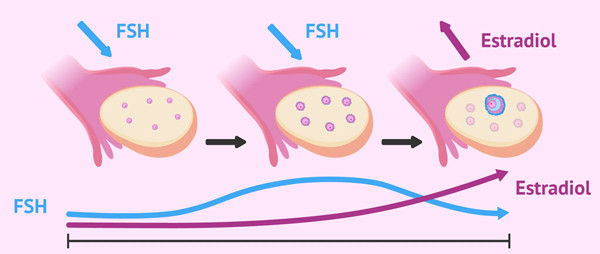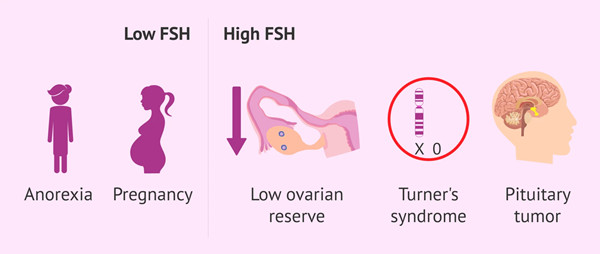Follicle-Stimulating Hormone (FSH): What It Is and Its Functions?
Introduction
Follicle-Stimulating Hormone (FSH) is a hormone that is essential to the human reproductive system. It plays important roles in both men and women, particularly in follicle development, spermatogenesis, and sex hormone regulation. Understanding the function of FSH and its regulatory mechanisms is important for reproductive health, infertility treatment and diagnosis of endocrine diseases.
Secretion and regulation of FSH
FSH is a glycoprotein hormone secreted by the anterior pituitary gland and belongs to the gonadotropin family, which, together with luteinizing hormone (LH), regulates the functioning of the gonads (ovaries and testes.) FSH secretion is regulated by gonadotropin-releasing hormone (GnRH) released by the hypothalamus, and also by negative feedback regulation of the sex hormones (such as estrogen and testosterone).
1.Regulation in the female body
- During the follicular phase of the menstrual cycle, FSH levels rise to stimulate the growth and development of follicles in the ovaries.
- As the follicle matures, estrogen levels rise and feedback inhibits FSH secretion to prevent overdevelopment of multiple follicles.
- During ovulation, FSH acts synergistically with LH to induce mature follicles to rupture and release eggs.
2. Regulation in the male
- FSH acts on the supporting cells of the testes (Sertoli cells) to promote spermatogenesis (spermatids).
- Testosterone and inhibin (Inhibin) regulate FSH secretion through a negative feedback mechanism to maintain normal spermatogenesis.
Main Functions of FSH
1. Role in the Female Reproductive System
FSH plays a central role in the female reproductive process and its main functions include:
- Promoting follicular development: FSH stimulates the growth of primordial follicles in the ovary to develop into mature follicles.
- Regulating estrogen secretion: During follicular development, FSH prompts granulosa cells to produce estrogen in preparation for endometrial thickening and ovulation.
- Synergize with LH to trigger ovulation: In the middle of the menstrual cycle, FSH and LH work together to induce the rupture of mature follicles and release eggs.
- Maintaining luteal function: During the luteal phase, FSH contributes to the formation of the corpus luteum to support progesterone secretion and maintain early pregnancy.
2. Role in the Male Reproductive System
In the male body, the main function of FSH is to support spermatogenesis:
- Stimulation of support cells (Sertoli cells): FSH promotes the development of support cells, which provide nutrients to spermatozoa and maintain the spermatogenic microenvironment.
- Promotion of spermatogenesis: FSH acts synergistically with testosterone to ensure the differentiation of spermatogonia into mature spermatozoa.
- Regulates inhibin secretion: Inhibin secreted by support cells feedback regulates FSH secretion to maintain spermatogenic homeostasis.
FSH Abnormalities and Related Disorders
Abnormal FSH levels may affect reproductive function and lead to a range of diseases:
1. Excessive FSH levels
- Women: may indicate a decline in ovarian function (e.g., premature ovarian failure or menopause), when FSH is elevated in an attempt to stimulate follicular development but the ovaries are no longer able to respond properly.
- Male: may be due to impaired testicular function (e.g., Kirschner’s syndrome), resulting in decreased sperm production and compensatory elevation of FSH.
2. Low FSH levels
- Hypothalamic or pituitary dysfunction (e.g., Kalman syndrome) may result in inadequate FSH secretion, affecting follicular development or spermatogenesis, which in turn leads to infertility or sterility.
3. Application of FSH in infertility treatment
FSH is widely used in assisted reproductive technologies (e.g. IVF) due to its key role in the reproductive process:
- Ovulation promotion treatment: by injecting exogenous FSH, it stimulates the development of multiple follicles and improves the chances of conception.
- Treatment of male oligospermia: In some cases, FSH can be used to improve sperm count and quality.
Conclusion
Follicle Stimulating Hormone (FSH) is one of the core hormones regulating reproductive health and plays a vital role in follicular development, spermatogenesis, and sex hormone balance.Abnormal FSH levels can lead to problems such as infertility, menstrual disorders, or hypogonadism. By testing FSH levels, doctors can assess reproductive function and develop a treatment plan accordingly. As reproductive medicine advances, the use of FSH in assisted reproductive technology will continue to bring hope to infertile patients.
Understanding the function of FSH and its regulatory mechanisms is not only helpful for medical research, but also an important guide for personal reproductive health management
We Baysen Medical is always focus on diagnostic technique to improve the quality of life . We have developed 5 technology platforms- Latex , colloidal gold , Fluorescence Immunochromatographic Assay , Molecular,Chemiluminescence Immunoassay, Our FSH Rapid test,LH Rapid test and POCT FSH, POCT LH test easy operation and can get test result in 15 mins
Post time: Jul-17-2025

